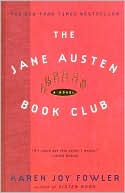
The Abstinence Teacher, Tom Perrotta
A fascinating cautionary tales of the dilemmas presented by extremism, Perrotta's book brings together the unlikeliest pairing of "heroes" in Tim Mason and Ruth Ramsey. Ramsey, a sexuality educator who insists on bucking the "abstinence-only" policy implemented by a predominantly Christian-right school board, finds herself head-to-head with her daughter's soccer coach, Tim Mason, a recovering-addict-turned-Christian, after Mason spontaneously breaks into prayer at the end of a game.
The story weaves through each character's history and the experiences that brought them to this particular battle, which, ironically, turns out not to be much of a battle at all.
As he did in Little Children, Perrotta creates characters who are so human, so understandably and thoroughly flawed that the line between 'good guy' and 'bad guy' blur. Being a fairly liberal-minded person myself, I fully expected to scoff at Mason's character and was ready to see him vilified as the judgmental, hypocritical image of Christianity that often gets portrayed in a story that pits the religious right against just about anyone else. I was prepared to embrace Ramsey as my heroine, my voice of reason and champion of my social and political views (what can I say? I am a bit fired up these days...).
But it was not nearly that simple. While my fundamental beliefs about the issues weren't changed by the book (and I don't think it was Perrotta's intention at all to do so), my idea about the people behind the issues were. I found myself, over and over again, sympathizing with Mason and also being a little annoyed with Ramsey. Even more surprisingly, I found the characters sympathizing with each other and ironically, even finding a sense of kinship between them as they each in their own way end up alienating those who are closest to them.
Just as Perrotta challenged us to look more closely behind the facade of suburbia in Little Children, he illustrates in The Abstinence Teacher that rarely is anything as black and white as our society tends to want to make it. It's not a comfortable realization; we like to believe we are right in our beliefs and sometimes it's easy to close ourselves off to the other side's point of view in an attempt to feel more secure in our own ideas. It's even easier to forget the human face of the other side; Perrotta's book serves to remind us that that human face is there, whether we like it or not.




